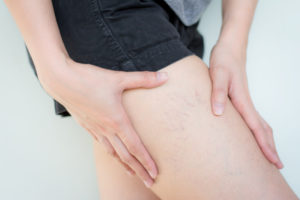As Houston and Dallas area vein specialists, we're often asked, "Why is my Vein Swollen?" Usually, this symptom means our patient has spider or varicose veins. Now, let's explore 5 causes of varicose veins. That way, we may be able to stop swollen veins before they start!

Varicose veins appear swollen because they're filled with blood. But why does that blood pool in your veins? This happens when valves inside your veins fail, making it harder for blood to flow back to your heart. Soon, that pooling blow stretches out the vein walls. And that's when they appear swollen and become visible on the surface of your skin.
But what causes valves to fail and triggers varicose veins? So many factors contribute to this form of vein disease. And these are some of the most common.
When you sit for too long, varicose veins may develop over time. Why is that the case? First, sitting helps make blood pool in your legs. Then, the veins face more pressure trying to pump that blood up and out of your legs and feet. If sitting for hours becomes a regular habit, that pressure can cause your veins to stretch and swell. The most common spot you'll notice this symptom is in your leg veins, since they're below the heart and have a hard time fighting gravity.
Just like sitting, standing up all day can make your veins swell. (That's why standing desks can cause problems for your veins, even as they keep you from too much sitting.) In this case, the problem comes from making your veins fight pooling blood, while supporting your full body weight. After all, your muscles can only help get blood out of your leg when they're activated and moving. So, to prevent damage, try moving as much as possible. And try exercises that build up your calf muscles, to make blood pumping more effective when you do move.
Your leg veins face pressure from your full body. For that reason, if you are currently above your ideal weight, that puts more pressure on those veins. Additionally, obesity raises your risk for high blood pressure, heart disease and diabetes. And all of those conditions can also increase your risk for swollen veins, as well as other complications.
During pregnancy and after a woman reaches menopause, her hormone levels change. These shifts make your veins more relaxed, which means they're more likely to stretch and swell. At the same time, your blood volume increases dramatically during pregnancy, and that extra pressure makes varicose veins more likely to develop.
As you get older, your vein valves start to deteriorate naturally. This can lead to reflux--when your blood flows back into your veins--which increases your risk for swollen veins. While we can't stop time from passing, we can follow a vein healthy diet and stick with a circulation-boosting exercise program to lower your risk.
Clearly, the valves in your veins are delicate. And you need them to keep blood flowing out of your legs, and prevent swelling or stretching in your veins. Now, to help prevent vein disease, you can certainly avoid these risk factors. But, if you notice slight swelling in any of your veins, make an immediate appointment at one of our five Houston and Dallas area vein clinics. Remember, vein disease is progressive. So the sooner you seek treatment, the easier it will be to give you back your healthy veins!

Scheduling
Please contact our dedicated specialists to schedule a consultation today.
2025 Texas Endovascular. All rights reserved. Website Design by Healthcare Success